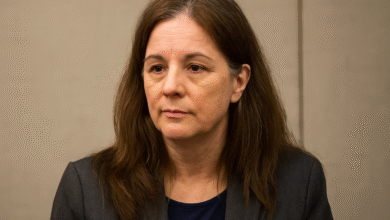Mary Nightingale Illness: Resilience Behind the Newsroom Spotlight

Introduction: A Voice That Became a Nation’s Constant
Mary Nightingale has long been a pillar of British television journalism. As the lead presenter of ITV Evening News, her calm and commanding voice has become a daily companion to millions. But behind her composed presence lies a deeply personal story—one of battling a mysterious health issue that threatened to silence her defining trait: her voice. This is the story of Mary Nightingale illness—her resilience, quiet strength, and how she rose above a hidden struggle with grace.
The First Signs: When the Voice Begins to Fade
In the early days of her prominent broadcasting career, Mary began experiencing troubling vocal symptoms—cracking, fading, and strain, particularly during live coverage. These symptoms intensified under pressure, sometimes forcing her to leave broadcasts prematurely. For someone whose career depended on vocal clarity, this wasn’t just inconvenient—it was emotionally and professionally destabilizing.
Mary Nightingale Illness: A Silent Battle Off-Camera
At first, Mary chose not to share her condition publicly. For over a year, she privately sought medical advice—undergoing various tests, enduring procedures, and confronting the haunting question: What if this is something serious like cancer? The experience was marked by anxiety and isolation. Yet through it all, she continued delivering the news—an extraordinary testament to her determination and professional dedication.
Public Speculation and Media Curiosity
As Mary’s on-air absences increased, public curiosity grew. Speculation swirled across social media and tabloids, prompting fans to voice their concern. Eventually, it was revealed that she was dealing with a vocal condition—though the full details remained private. The disclosure balanced public interest with personal boundaries, a rare accomplishment in today’s media landscape.
The Elusive Diagnosis: No Name, Just Pressure
After exhaustive tests, doctors could not pinpoint a specific illness. Instead, they attributed her vocal troubles to intense occupational stress, long working hours, and the physical demands of live broadcasting. While this brought relief—it wasn’t life-threatening—it also meant recovery was largely in her own hands.
Mary’s journey reveals an important truth: not all health battles have neat diagnoses. Sometimes, the wear and tear of relentless professional pressure takes a hidden toll.
Adapting to Preserve Her Career
To protect her voice, Mary likely adopted a range of strategies—vocal rest between broadcasts, hydration routines, speech therapy, and stress-reduction techniques. While she never publicly detailed her treatment plan, insiders recognized her discipline and consistency as key to recovery.
ITV also played a vital role. Adjustments to her schedule and a supportive team environment enabled her to rest when needed and return stronger. Her colleagues’ quiet support underscores how essential workplace empathy is in high-stress professions.
A Wave of Support from Viewers and Peers
Public reaction was overwhelmingly supportive. Long-time viewers expressed concern, admiration, and gratitude for her professionalism. Media peers praised her resolve in facing a condition that could have ended her career. In a field where appearances are often prioritized over well-being, Mary’s transparency—without oversharing—set an important example.
Mary Nightingale Illness: The Mind-Body Connection in Journalism
Mary’s experience brings attention to the growing conversation about how mental and emotional stress can manifest physically. In high-pressure roles like journalism, burnout is real, and the symptoms—like vocal strain—can have significant consequences.
Her story reminds us that emotional health isn’t a luxury—it’s foundational. The belief that her vocal strain was stress-induced highlights the powerful interplay between body and mind in performance-driven careers.
The Comeback: A Career That Refused to Dim
Despite the health scare, Mary never stepped away from her anchor role. She returned to full-time broadcasting and remains a mainstay at ITV Evening News. Her enduring presence, poise, and professionalism reflect the strength of the recovery process she embraced.
Rather than fade, she continued to shine. Her ability to bounce back without losing her edge serves as quiet but powerful inspiration—not just to fellow broadcasters but to anyone navigating invisible challenges.
Lessons from Mary Nightingale Illness Journey
There are many takeaways from Mary’s experience, especially for professionals in high-demand fields:
-
Listen to Your Body: Don’t ignore small changes—they can signal bigger issues.
-
Act Quickly: Early intervention can make all the difference.
-
Prioritize Mental Wellness: Emotional strain can manifest in physical ways.
-
Use Your Support System: Colleagues and employers can play a crucial role in recovery.
-
Balance Privacy and Transparency: You can share your struggles without losing control of your narrative.
A Legacy Beyond News Reporting
Today, Mary Nightingale is more than just a journalist—she’s a symbol of strength, discretion, and resilience. She handled a deeply personal challenge without turning it into a public spectacle. Her quiet battle and remarkable comeback offer lessons in professionalism and grace.
In a culture obsessed with oversharing, Mary chose restraint. And in doing so, she allowed her actions to speak louder than headlines ever could.
Conclusion: The Power of Quiet Strength
Mary Nightingale illness journey is a poignant reminder that even the most dependable voices can falter—and that there’s courage in vulnerability. Her comeback speaks to the strength that doesn’t always roar. Sometimes, it whispers through consistency, perseverance, and commitment to one’s purpose.
In her story, we don’t just see a respected broadcaster. We see a role model—one who faced adversity with dignity and came back stronger, still guiding the nation through the evening news.
FAQs: Mary Nightingale Illness
Q1: What illness did Mary Nightingale have?
Mary never received a definitive diagnosis. Her condition was likely stress-induced vocal strain rather than a specific illness or disease.
Q2: Is Mary Nightingale still presenting the news?
Yes, she continues to present ITV Evening News and remains a respected figure in British journalism.
Q3: Did she ever publicly discuss her illness?
Mary acknowledged a vocal issue but has kept most details private, balancing transparency with discretion.
Q4: How did she recover from her voice condition?
Though she hasn’t revealed specifics, recovery likely involved vocal rest, speech therapy, hydration, stress management, and workplace support.
Q5: What can professionals learn from her experience?
Her journey highlights the importance of mental wellness, early intervention, support networks, and the power of quiet resilience.
Read also:The Quiet Strength of Maddie Lagina: Her Life, Family & Career Path



